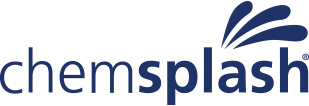Key Features of Disposable Coveralls: A Buyer's Guide
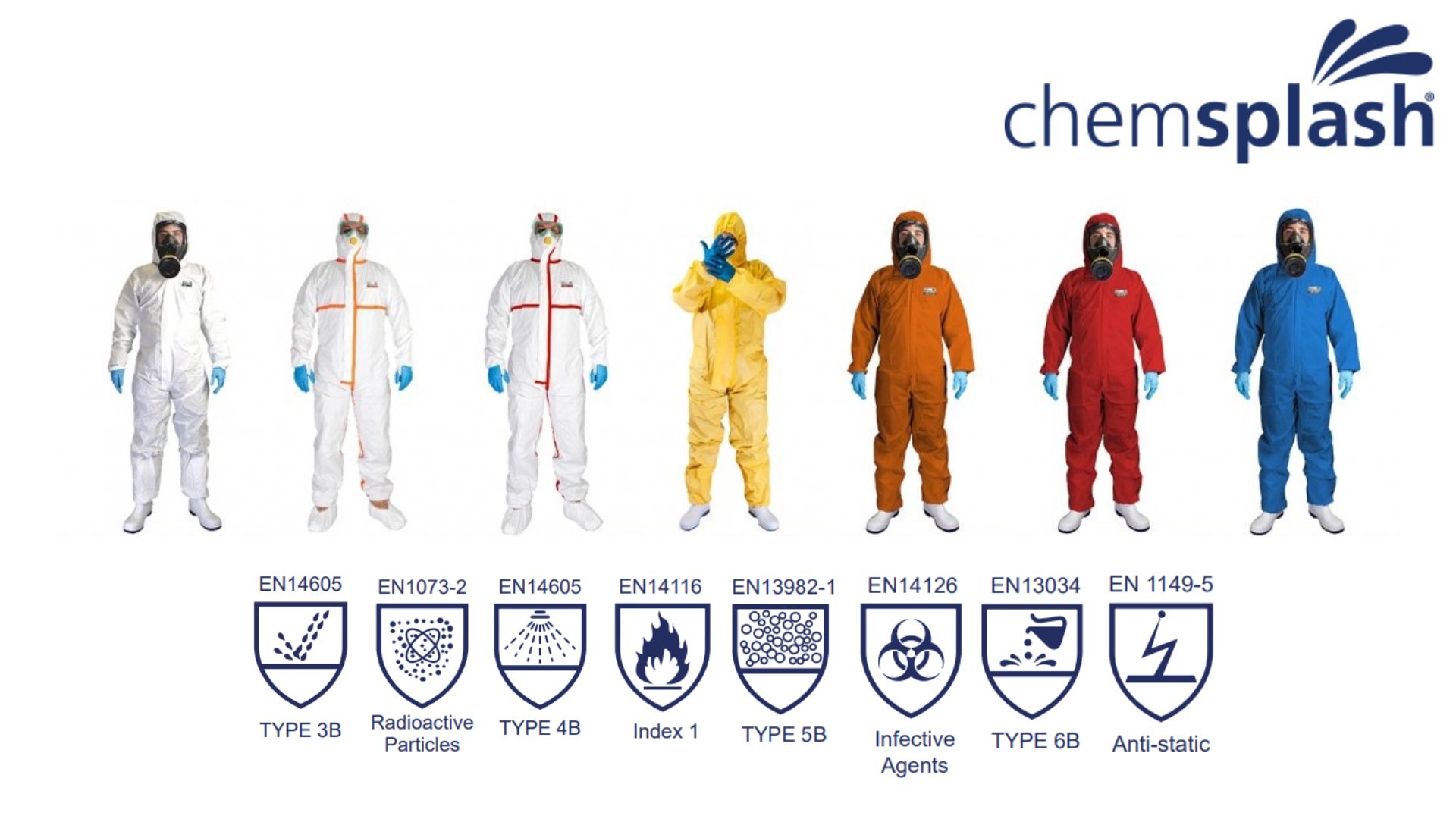
Disposable coveralls are essential for a wide range of industries, providing protection against various hazards such as chemicals, particles, and biological agents. Selecting the right coverall is crucial for ensuring safety and compliance with industry standards.
This buyer's guide will help you understand the key features to look for when choosing disposable coveralls, including material types, safety standards, and suitable applications.
Table of Contents
- Overview of Coverall Types
- Key Features to Consider
- Safety Standards and Certifications
- Geschikte toepassingen
Overview of Coverall Types
Type 5/6 Coveralls
Type 5/6 coveralls are designed to offer protection against airborne particles and limited liquid splashes. These coveralls are ideal for environments where there is a risk of exposure to hazardous dust and light liquid splashes. Common applications include construction, general maintenance, and certain industrial settings. They typically feature breathable materials, ensuring comfort during extended wear, and often include elasticated hoods, cuffs, and ankles for a secure fit.
| Chemsplash Eka 55 Type 5B/6B |
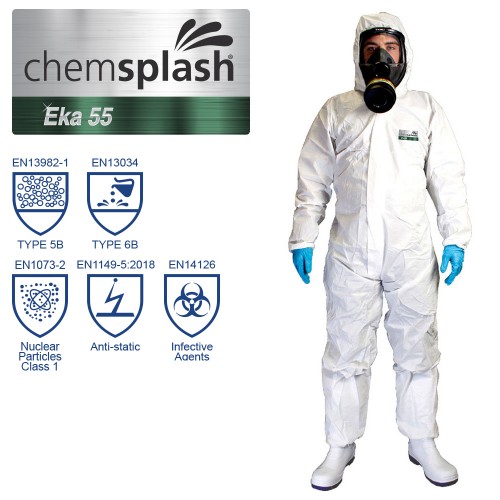 |
Suitable For:
- Bouw
- General maintenance
- Industrial settings
- Medical environments with limited exposure to fluids
Key Features:
- Protection against airborne particles and limited liquid splashes
- Breathable materials for comfort
- Elasticated hoods, cuffs, and ankles
- Two-way zip for easy wear and removal
- Adhesive zip flap for additional sealing
Type 4/5/6 Coveralls
Providing a step up in protection, Type 4/5/6 coveralls offer enhanced liquid resistance compared to Type 5/6. These coveralls are suitable for tasks involving moderate liquid exposure and hazardous particles. They are commonly used in industrial cleaning, paint spraying, agricultural applications, and certain medical settings. The added liquid protection makes them versatile for environments where both particle filtration and liquid barrier are required. Key features often include taped seams and higher-grade fabric to ensure superior protection and durability.
| Chemsplash Pro +4 Overall - Type 4B/5B/6B |
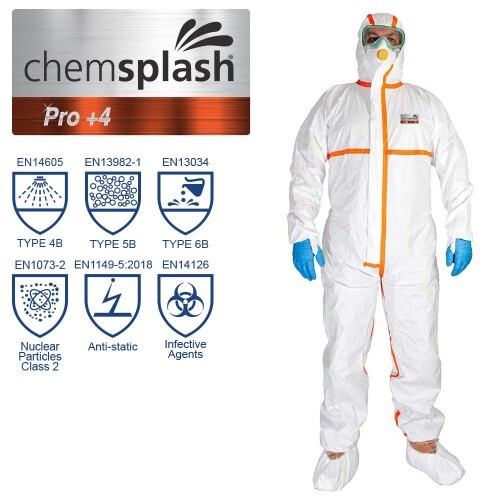 |
Ideal For:
- Industrial cleaning
- Paint spraying
- Agricultural applications
- Medical environments with moderate exposure to fluids
Key Features:
- Enhanced liquid resistance
- Protection against hazardous particles
- Taped seams for a stronger barrier
- Higher-grade fabric for durability
- Elasticated hood, back, and ankles
- Knitted cuffs for added comfort
Type 3/4 Coveralls
Type 3/4 coveralls are designed for the highest level of liquid protection, including resistance to sprays and strong jets. These coveralls are essential in environments with significant chemical hazards, such as petrochemical industries, handling of hazardous liquids, and emergency response situations. They are also suitable for medical and pharmaceutical environments where high-level contamination control is necessary. The robust construction often includes fully taped or ultrasonically welded seams, multiple layers of protective fabric, and additional features like thumb loops and adhesive flaps for maximum coverage and security.
| Chemsplash Jet Spray 88 - Type Type 3B/4B 5B/6B |
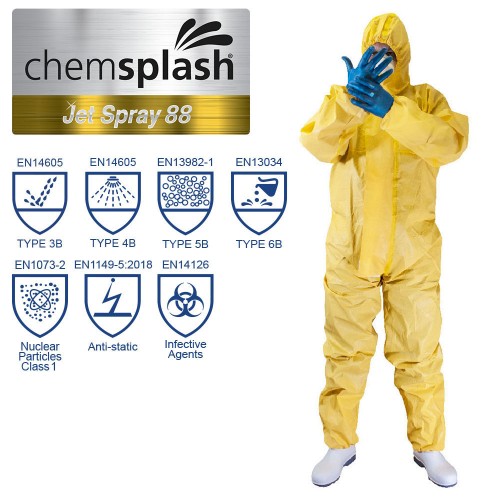 |
Perfect For:
- Petrochemical industries
- Handling hazardous liquids
- Emergency response situations
- Medical and pharmaceutical environments
Key Features:
- Highest level of liquid protection
- Fully taped or ultrasonically welded seams
- Multiple layers of protective fabric
- Additional features like thumb loops and adhesive flaps
- Elasticated cuffs with thumb loops for secure fit
- Low-linting fabric for clean environments
Overalls van categorie I
Category I coveralls provide basic protection against minimal risks, suitable for low-hazard environments. These coveralls are often used for tasks that require basic cleanliness and contamination prevention, such as food processing, non-hazardous cleaning, and light-duty maintenance work. They can also be used in medical environments where only minimal fluid exposure is expected. While they do not offer the advanced protection of higher-rated coveralls, Category I coveralls are an economical choice for scenarios where only limited protection is needed. They typically feature simple designs and materials, focusing on comfort and ease of use.
| Chemsplash Polypropylene Disposable Coverall |
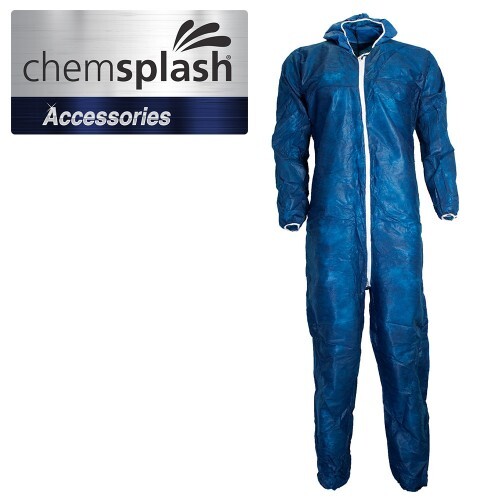 |
Suitable For:
- Food processing
- Non-hazardous cleaning
- Light-duty maintenance work
- Medical environments with minimal exposure to fluids
Key Features:
- Basic protection against minimal risks
- Simple designs for comfort and ease of use
- Lightweight materials for enhanced mobility
- Elasticated cuffs, ankles, and waist for secure fit
- Easy to don and doff with simple closure systems
By understanding the different types of coveralls and their respective protection levels, you can make an informed decision on the best coverall to meet your specific needs. Whether you require basic protection for low-risk tasks or advanced barriers against hazardous chemicals, choosing the right type of coverall is crucial for ensuring safety and compliance in your work environment.
Key Features to Consider
When choosing disposable coveralls, it's essential to consider various features to ensure they meet the specific needs of your work environment. Here are some key features to look for:
Materiaal
SMS Stof
- Provides breathability and basic protection.
- Ideal for tasks requiring comfort over long periods.
- Suitable for non-hazardous environments and general maintenance.
-> Browse SMS Fabric Coveralls
Microporeuze gelamineerde stof
- Offers higher protection while maintaining breathability.
- Effective barrier against liquid splashes and hazardous particles.
- Suitable for industrial cleaning, paint spraying, and medical environments.
-> Browse Microporous Laminate Fabric Coveralls
High Density Polyethylene
- Known for durability and protection against a wide range of hazards.
- Provides excellent resistance to chemical splashes and particulate contamination.
- Ideal for harsh environments such as petrochemical industries and emergency response.
-> Browse High Density Polyethylene Fabric Coveralls
Polyprop/Polyethyleen Multilayer Laminaat
- Combines multiple layers for enhanced protection.
- High resistance to liquid penetration and hazardous particles.
- Suitable for high-risk environments including pharmaceutical and nuclear facilities.
-> Browse Polyprop/Polyethylene Multilayer Laminate Fabric Coveralls
Seams
Gebonden naden
- Reinforces the coverall structure.
- Provides added durability and longevity.
- Suitable for general use where moderate protection is needed.
-> Browse Coveralls with Bound Seams
Getapete naden
- Ensures a stronger barrier against liquids and particles.
- Essential for environments with high liquid exposure.
- Common in industrial and medical applications requiring higher protection levels.
-> Browse Coveralls with Taped Seams
Breathability
- Essential for long-term wear comfort and reducing heat stress.
- Prevents overheating during extended use.
- Important for maintaining productivity and safety in hot or physically demanding environments.
-> Find Coverall: Chemsplash Cool 67 Breathable Coverall Type 5/6
Anti-static Properties
- Reduces the risk of static discharge, which can be crucial in certain environments.
- Protects sensitive electronic equipment and reduces fire hazards.
- Essential for use in cleanrooms, pharmaceutical industries, and areas with flammable substances.
-> Browse Anti-static Coveralls
Liquid Resistance
- Varying degrees of protection from liquid splashes to strong jets.
- Important for ensuring safety in environments with chemical exposure.
- Ensures worker safety in petrochemical, industrial cleaning, and paint spraying applications.
-> Browse Liquid Resistant Coveralls
Particle Filtration Efficiency
- Important for environments with hazardous particles or infectious agents.
- Provides protection against dust, asbestos, and other airborne contaminants.
- Critical for medical, pharmaceutical, and cleanroom applications to prevent contamination.
-> Browse Coveralls with Particle Filtration Efficiency
Additional Features
Met halsband
- Offers added neck protection.
- Suitable for environments where upper body protection is crucial.
-> Browse Coveralls with Collar
Met de voeten
- Ensures full body coverage.
- Prevents contaminants from entering footwear, ideal for cleanrooms and hazardous environments.
Grote maten
- Availability in sizes to fit different body types.
- Ensures a proper fit for all workers, enhancing safety and comfort.
-> Browse Coveralls in Large Sizes
Steriel bestraald
- Suitable for cleanroom and medical environments.
- Ensures garments are free from contaminants and safe for use in sterile settings.
-> Browse Sterile Irradiated Coveralls
Considering these features will help you choose the right disposable coverall for your specific needs, ensuring maximum protection and comfort in your work environment.
Safety Standards and Certifications
When selecting disposable coveralls, it is crucial to ensure they meet relevant safety standards and certifications. These standards guarantee that the coveralls provide the necessary protection for specific hazards. Here are some key standards and certifications to look for:
EN13034 Type 6
- Description: Limited protection against liquid chemicals.
- Applications: Suitable for environments where there is a risk of light liquid splashes.
- Typical Use: General maintenance, light industrial tasks, and minimal chemical exposure.
EN13982-1 Type 5
- Description: Protection against airborne solid particles.
- Applications: Ideal for tasks involving exposure to hazardous dust and particulates.
- Typical Use: Construction, asbestos handling, and general industrial environments.
EN13982-1 Type 5B
- Description: Additional protection against biological agents.
- Applications: Suitable for environments with both particulate and biological hazards.
- Typical Use: Medical, pharmaceutical, and cleanroom settings where biohazard protection is required.
EN13034 Type 6B
- Description: Limited liquid protection with biological protection.
- Applications: Combines light liquid splash protection with biohazard protection.
- Typical Use: Laboratories, healthcare facilities, and certain industrial applications.
EN1149-5 anti-statisch
- Description: Protection against electrostatic discharge.
- Applications: Essential in environments where static discharge could cause harm.
- Typical Use: Cleanrooms, electronics manufacturing, and flammable environments.
EN14126 Infectieuze agentia
- Description: Protection against infective agents.
- Applications: Designed for use in areas with risk of exposure to biological hazards.
- Typical Use: Healthcare, laboratory work, and emergency response involving infectious diseases.
EN1073-2 Nuclear Particles Class 1
- Description: Protection against particulate radioactive contamination.
- Applications: Suitable for environments where there is a risk of radioactive particle exposure.
- Typical Use: Nuclear facilities, medical radiology, and certain research environments.
EN14116 Index I Beperkte vlamverspreiding
- Description: Limited flame spread protection.
- Applications: Provides a basic level of protection against flames.
- Typical Use: Environments with a minimal risk of fire exposure, such as certain industrial settings.
EN14605 Type 4B
- Description: Protection against liquid chemical sprays.
- Applications: Suitable for environments with a risk of liquid chemical spray exposure.
- Typical Use: Chemical handling, industrial cleaning, and emergency response.
EN14605 Type 3B
- Description: Protection against strong liquid chemical jets.
- Applications: Provides high-level protection against intense liquid chemical exposure.
- Typical Use: High-risk chemical processing, petrochemical industries, and emergency situations involving hazardous liquids.
Understanding these safety standards and certifications will help you choose the appropriate disposable coverall for your specific needs, ensuring that you and your team are protected against the relevant hazards in your work environment.
Geschikte toepassingen
Choosing the right disposable coveralls depends significantly on the specific application and the hazards present in the work environment. Below, we outline the most suitable types of coveralls and relevant safety standards for various applications:
Medisch
For medical environments, protection against biological hazards is paramount. Type 5B/6B coveralls, which offer protection against airborne particles and limited liquid splashes, are ideal. These coveralls conform to standards like EN14126 for protection against infective agents and EN13982-1 Type 5B, ensuring safety from biological threats and particulate contamination.
Farmaceutische industrie
In pharmaceutical industries, maintaining cleanroom standards and controlling contamination are critical. Type 4B/5B/6B coveralls, made from microporous laminate fabric, provide enhanced liquid and particle protection. Standards such as EN14126 for infective agents and EN1149-5 for anti-static properties ensure a sterile environment, free from contamination.
Bouw
Construction sites involve exposure to dust and debris. Type 5/6 coveralls, conforming to EN13982-1 Type 5 and EN13034 Type 6 standards, offer suitable protection against airborne solid particles and limited liquid splashes. These coveralls are typically breathable, providing comfort for extended wear.
Asbest gerelateerde werkzaamheden
When working with asbestos, high filtration efficiency against harmful particles is essential. Type 5B coveralls, compliant with EN13982-1 Type 5B standards, offer robust protection against airborne asbestos fibers, ensuring worker safety during removal or abatement tasks.
Verf spuiten
Paint spraying involves exposure to chemical splashes. Type 4/5/6 coveralls, which offer enhanced liquid protection, are recommended. These coveralls should meet EN14605 Type 4B standards for protection against liquid chemical sprays, ensuring the wearer is shielded from paint and solvents.
Industriële reiniging
Industrial cleaning requires a barrier against chemical splashes and particles. Type 4B/5B/6B coveralls are suitable, providing protection conforming to EN14605 Type 4B for liquid sprays and EN13982-1 Type 5B for particles. These coveralls ensure safety in environments with significant chemical exposure.
Voedselverwerking
In food processing, maintaining hygiene and preventing contamination is crucial. Category I coveralls, providing basic protection and meeting standards such as EN13034 Type 6 for limited liquid protection, are suitable. These coveralls are designed to be sterile and non-linting, ideal for cleanroom environments.
Landbouw
Agricultural work involves exposure to pesticides and chemicals. Type 4B/5B/6B coveralls offer suitable protection, meeting standards like EN14605 Type 4B for liquid chemical sprays and EN13982-1 Type 5B for particles. These coveralls ensure safety from harmful agricultural chemicals.
Petrochemische industrieën
For petrochemical industries, high chemical resistance is essential. Type 3B/4B coveralls, compliant with EN14605 Type 3B for strong liquid chemical jets and EN13982-1 Type 5B for particles, provide robust protection. These coveralls shield workers from hazardous chemical exposure.
Cleanrooms
In cleanrooms, sterile, non-linting coveralls are required to maintain contamination control. Type 4B/5B/6B coveralls, made from low-linting microporous laminate fabric and meeting standards like EN14126 for infective agents, are ideal for these environments.
Hout- en metaalbewerking
Wood and metal processing generate dust and small particles. Type 5/6 coveralls, offering protection against airborne particles and limited liquid splashes, are suitable. These coveralls meet EN13982-1 Type 5 and EN13034 Type 6 standards, ensuring worker safety.
Onderhoudswerkzaamheden aan nucleaire faciliteiten
Maintenance at nuclear facilities involves exposure to radioactive particles. Type 5B/6B coveralls, meeting EN1073-2 standards for protection against particulate radioactive contamination, ensure safety from nuclear hazards, making them essential for such high-risk environments.
By selecting coveralls that meet the appropriate standards for each application, you can ensure maximum protection and compliance with safety regulations in your work environment.
Conclusie
Selecting the right disposable coveralls is essential for ensuring the safety and protection of workers across various industries. By understanding the different types of coveralls, key features to consider, safety standards, and suitable applications, you can make an informed decision that meets your specific needs.
Key Points:
- Types of Coveralls: Ranging from Type 5/6 for basic protection against airborne particles and light splashes, to Type 3/4 for high-level protection against strong chemical jets.
- Key Features: Material choices, seam construction, breathability, anti-static properties, liquid resistance, and additional features like collars and feet coverage are crucial.
- Safety Standards: Ensure coveralls meet relevant standards such as EN13034, EN13982-1, EN1149-5, EN14126, EN1073-2, EN14605, and EN14116 for specific hazards.
- Suitable Applications: Tailor your choice based on the specific industry needs, from medical and pharmaceutical environments to construction, industrial cleaning, agriculture, and emergency response.
Choosing the appropriate coverall for your specific task and environment is vital for maintaining safety and compliance. The right coverall not only protects against hazards but also ensures comfort and functionality for the wearer.
Explore the comprehensive range of disposable coveralls available at Chemsplash. Find the perfect coverall that meets your safety requirements and ensures maximum protection for your team. Make the right choice today and enhance safety in your workplace with Chemsplash's high-quality disposable coveralls.
Uw e-mailadres kan niet worden gepubliceerd. Verplichte velden zijn gemarkeerd*
